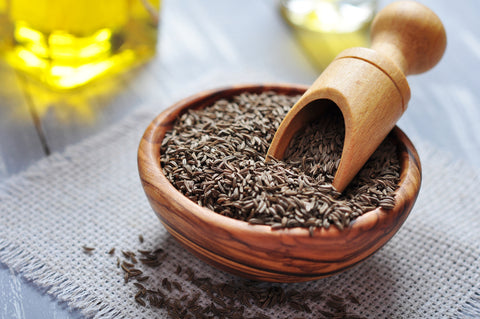Health Benefits and Uses of Culinary Spices: Cumin

Food as Medicine
Health Benefits and Uses of Culinary Spices: Ground Cumin & Cumin Seeds
In the Ayurvedic system of medicine, cumin seeds have immense medicinal value, particularly for digestive disorders
By Mark Zuleger-Thyss, Garden of Healing
❤️ Save to Favorites
Alternative names include:
Cuminum cyminum, Comino seed, Anis Âcre, Black Cumin Seed Oil, Cumin de Malte, Huile de Graines de Cumin Noir, Jeeraka, Svetajiraka, and Zira.
Spices have been used for centuries for culinary and medicinal purposes. Their power to impart biological activity is now reemerging as an area of interest for human health. More Americans are considering them for therapeutic use, especially for chronic health conditions. Cumin is one such spice you can find in your kitchen. It is a delicious addition to any recipe and may offer some health benefits.
Taste Profile
Cumin has a distinctive aroma that is heavy, strong, and earthy. It is sometimes confused with caraway, but cumin is hotter to the taste, lighter in color, and larger in size. Culinary science categorizes cumin as an aromatic spice. Allspice (pimento), cardamom, cassia, cinnamon, and clove fall into the same category.
Types and Uses of Cumin Spice
There are several varieties of cumin seeds, and the most common is green cumin. The brown version is the one most often found in the kitchen. Still, a black variety is used to make a potent oil celebrated for its healing benefits and medicinal qualities.
Black cumin is much less common and is rarely used outside of Indian and Pakistani cuisine. While the black variety is left whole and rarely ground, green cumin is plentiful, either whole or powdered.
Culinary Applications
Cumin is popular in Asian, Indian, North African, Tex-Mex, and Latin American cuisines.
If you would like to keep cumin on hand in your kitchen, store it in a sealed container in a cool, dry cupboard. Cumin keeps the longest when left in the whole-seed form, about one year. Ground cumin will remain potent for roughly six months, providing you shield it from dampness and excessive heat. For peak freshness, use a mortar and pestle or a spice mill to grind your seeds.

How to Cook with Cumin
Bring out cumin's unique flavor by toasting the seeds in a dry cast-iron skillet before adding them to recipes. The heat releases the oils, and this will add an earthy aroma and complexity to your dishes.
How Cumin is Grown, Harvested, and Processed
Cumin comes from a small herbaceous plant that belongs to the same family as parsley and fennel. It is the seed of this plant that we recognize as cumin. The plant grows to about 1 to 2 feet tall, and once it blooms in clusters of small purple flowers, the stems are picked by hand and allowed to dry. The seeds are then harvested. The plant is native to the Mediterranean region and Egypt. It is cultivated from the Western Mediterranean through the Middle East and India. While the largest cumin consumer is India, Iran is one of the seed's most significant exporters to the world market.
Health Benefits of Cumin
People use cumin for many health conditions. Studies have shown that cumin may help control cholesterol levels. In one study, cumin powder dissolved in yogurt helped reduce "bad" cholesterol and triglycerides while increasing "good" cholesterol.
Cumin is an excellent source of calcium, manganese, magnesium, and phosphorus. There are several vitamins present in it, such as vitamins A, C, E, K, B6, niacin, riboflavin, and thiamine. Cumin is also very low in sodium, cholesterol, and saturated fats and is rich in dietary fiber. Foods containing vitamin C can act as immune system supporters. These foods can reduce inflammation, fight free radicals, and regulate blood pressure.
Taking cumin might improve weight loss in obese adults. When you have an optimized digestive system and faster metabolism, you will lose weight. Cumin helps in burning calories faster by increasing the speed of metabolism and improving digestion.

The most common use of cumin has been in digestion-related issues. Cumin powder contains thymol, a component that boosts the production of digestive enzymes. It increases bile production from the liver while aiding in the digestion of fats and other nutrients in the gut.
Cumin is rich in nutrients such as iron and copper, needed for healthy red blood cells. It may help control blood pressure, too. Taking black cumin seed extract has been shown to reduce high blood pressure in people whose blood pressure was elevated.
Cumin and black cumin are excellent sources of antioxidants that may decrease inflammation and protect against oxidative damage in the human body. Some of those antioxidants include alkaloids, flavonoids, phenols, and terpenes.
In herbal medicine, Cuminum cyminum is classified as a stimulant, carminative, and antimicrobial. In the Ayurvedic system of medicine in India, cumin seeds have immense medicinal value. Practitioners use it to balance all three Doshas (Vata, Pitta, and Kapha), and it helps flush toxins out of the body. The benefits of cumin seeds and cumin powder have been known since ancient times, while others are newly being discovered. Use it to your heart’s content in cooking – it is excellent food as medicine.

© 2021 Mark Zuleger-Thyss, Garden of Healing. All rights reserved.
